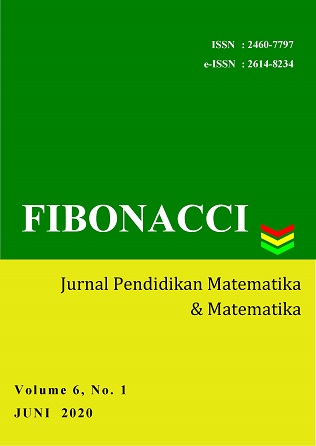STUDI LITERASI: PEMAHAMAN KONSEP ANAK PADA PEMBELAJARAN MATEMATIKA
Main Article Content
Abstract
Article Details
Authors who publish with this journal agree to the following terms:
- Authors retain copyright and grant the journal right of first publication with the work simultaneously licensed under a Creative Commons Attribution License that allows others to share the work with an acknowledgement of the work's authorship and initial publication in this journal.
- Authors are able to enter into separate, additional contractual arrangements for the non-exclusive distribution of the journal's published version of the work (e.g., post it to an institutional repository or publish it in a book), with an acknowledgement of its initial publication in this journal.
- Authors are permitted and encouraged to post their work online (e.g., in institutional repositories or on their website) prior to and during the submission process, as it can lead to productive exchanges, as well as earlier and greater citation of published work (See The Effect of Open Access).
References
Ansari, Bansu I. 2016. Komunikasi Matematik, Strategi Berpikir Dan Manajemen Belajar: Konsep Dan Aplikasi. Banda Aceh: PeNA.
Aqib, Zaenal. 2016. Model-Model, Media, Dan Strategi Pembelajaran Kontekstual (Inovatif). Bandung: YRAMA WIDYA.
Barmby, Patrick, David Bolden, and Lynn Thompson. 2014. 53 Journal of Chemical Information and Modeling Understanding and Enriching Problem Solving in Primary Mathematics. Northwich: Critical Publishing Ltd.
Bartell, Tonya Gau, Corey Webel, Brian Bowen, and Nancy Dyson. 2013. “Prospective Teacher Learning: Recognizing Evidence of Conceptual Understanding.” Journal of Mathematics Teacher Education. Vol. 16(1), pp: 57–79.
Beatty, Alexandra. 2011. Successful STEM Education: A Workshop Summary. Washington: The National Academic Press.
Churchill, Daniel. 2017. Digital Resources for Learning. Singapore: Springer Nature Singapore Pte Ltd.
Depdiknas. 2006. Permendiknas Nomor 22 Tahun 2006 Tentang Standar Isi Sekolah Dasar. Jakarta: Depdiknas.
Easterby-Smith, Mark, Richard Thorpe, and Paul R Jackson. 2015. Management and Business Research. 5th ed. London: SAGE Publications Ltd.
Englund, Claire, Anders D. Olofsson, and Linda Price. 2017. “Teaching with Technology in Higher Education: Understanding Conceptual Change and Development in Practice.” Higher Education Research and Development. Vol. 36(1), pp: 73–87.
Faye, Jan. 2014. The Nature of Scientific Thinking The Nature of Scientific Thinking: On Interpretation, Explanation, and Understanding Jan. New York: Palgrave Macmillan.
Fichte, J G. 2015. Lectures on the Theory of Ethics (1812). New York: State University of New York Press.
Garvis, Susanne, and Eva Nislev. 2017. “Mathematics with Infants and Toddlers.” In Engaging Families Educators Mathematics as Children’s First: International Perspectives, eds. Ann Gervasoni, Sivanes Phillipson, and Peter Sullivan. Singapore: Springer Nature, 33–46.
Hannah, John, Sepideh Stewart, and Michael Thomas. 2016. “Developing Conceptual Understanding and Definitional Clarity in Linear Algebra through the Three Worlds of Mathematical Thinking.” Teaching Mathematics and its Applications. Vol 35(4), pp: 1–20.
Höft, Lars, and Sascha Bernholt. 2019. “Longitudinal Couplings between Interest and Conceptual Understanding in Secondary School Chemistry: An Activity-Based Perspective.” International Journal of Science Education. Vol. 41(5), pp: 607–27.
Karim, Asrul. 2011. “Penerapan Metode Penemuan Terbimbing Dalam Pembelajaran Matematika Untuk Meningkatkan Pemahaman Konsep Dan Kemampuan Berpikir Kritis Siswa Sekolah Dasar.” Jurnal Penelitian Pendidikan Edisi Khus(1): 21–32.
Luna, Elle. 2015. The Crossroads of Should and Must: Find and Follow Your Passion. New York: Workman Publishing Company.
Nachowitz, Marc. 2019. “Intent and Enactment: Writing in Mathematics for Conceptual Understanding.” Investigations in Mathematics Learning. Vol 11(4), pp: 245–57.
Naidoo, Navindhra. 2011. “What Is Research? A Conceptual Understanding.” African Journal of Emergency Medicine. Vol 1(1), pp: 47–48.
NCTM. 2014. Principles to Actions: Ensuring Mathematical Success for All. Reston, VA: National Council of Teachers of Mathematics.
———. 2017. Enhancing Classroom Practice with Research behind Principles to Actions. Reston, VA: The National Council of Teachers of Mathematics, Inc.
Nugraheni, Esti Ambar, and Sugiman Sugiman. 2013. “Pengaruh Pendekatan PMRI Terhadap Aktivitas Dan Pemahaman Konsep Matematika Siswa SMP.” Pythagoras - Jurnal Pendidikan Matematika. Vol 8(1), pp: 101–8.
Porter, Tom. 2011. Will Alsop: The Noise. New York: Routledge.
Rasila, Antti, Jarmo Malinen, and Hannu Tiitu. 2015. “On Automatic Assessment and Conceptual Understanding.” Teaching Mathematics and its Application. Vol 34(3), pp: 149–59.
Santrock, John. 2011. Educational Psychology. 5th ed. New York: McGraw-Hill.
Souza de Cursi, Eduardo. 2015. Variational Methods for Engineers with Matlab®. Hoboken: John Wiley & Sons, Inc.
Stern, Julie, Nathalie Lauriault, and Krisrta Ferraro. 2018. Tools for Teaching Conceptual Understanding, Elementary. California: Corwin: A SAGE Publishing Company.
Zhang, Xiaofen, M. A.(Ken) Clements, and Nerida F. Ellerton. 2014. “Conceptual Mis(Understandings) of Fractions: From Area Models to Multiple Embodiments.” Mathematics Education Research Journal. Vol. 27(2), pp: 233–61.

